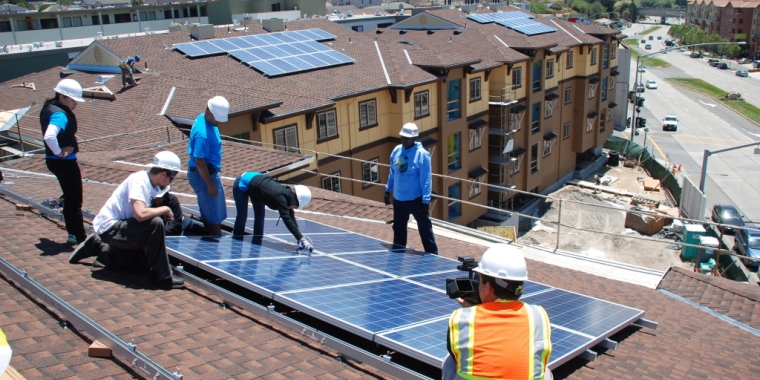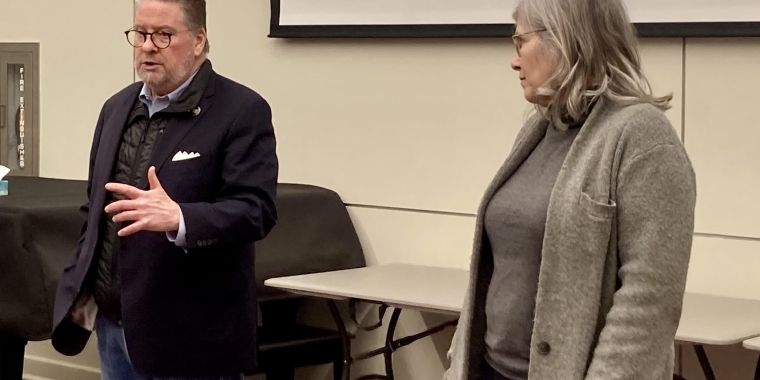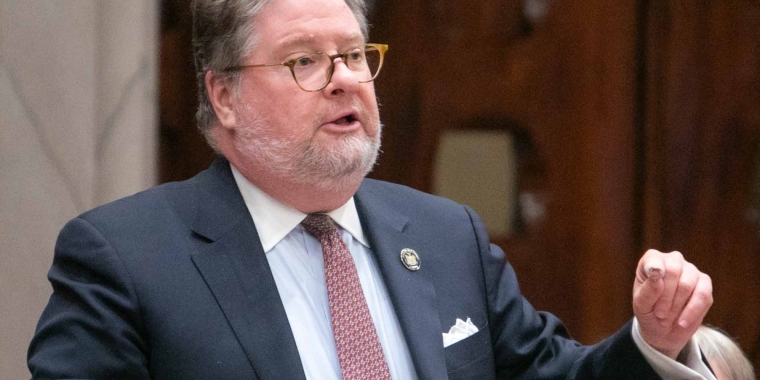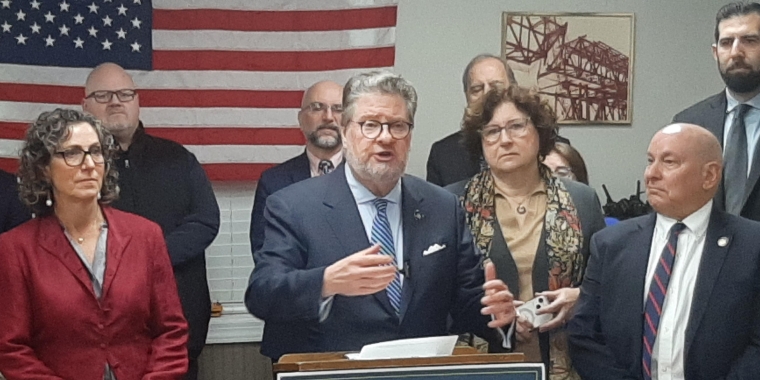
State Legislators, Advocates Call on PSC to Maintain Rooftop and Community Solar Funding
April 28, 2025

Rooftop solar systems have increasingly become a popular option across the country
Albany, NY – New York State Senator Pete Harckham and Assemblymember Deborah Glick, along with colleagues from the State Legislature and a number of clean energy advocates, called today on the New York Public Service Commission (PSC) to reverse its recent decision to eliminate $271 million in previously authorized funding from the state’s popular and successful rooftop and community solar program.
Because the NY-Sun Solar Program, which is overseen by the New York State Energy Research and Development Authority (NYSERDA), reached its goal of installing six gigawatts (6 GW) of “distributed”—i.e. rooftop and community—solar energy projects a year earlier than its 2025 goal, the PSC decided last week to reallocate unspent funding.
In justifying its decision, published on April 24, 2025, the PSC noted that, along with having reached its 6 GW goal, the state was on its way to arriving at a 10 GW goal by 2030. Additionally, the PSC argues that New York should expect more clean energy investments as part of the federal Inflation Reduction Act (IRA), passed in 2022, even as much of the IRA is now being rescinded and defunded by the Trump administration.
“The NY-Sun program, which is largely responsible for advancing the implementation of solar energy systems statewide, including in underserved, low-income communities, deserves as much funding as possible,” said Sen. Harckham, chair of the Senate Environmental Conservation Committee. “Putting the brakes on this clean energy momentum, which is creating thousands of green jobs and saving ratepayers millions of dollars, makes no sense at all. In fact, we should be doubling down on this program’s success and ramping up gigawatt goals instead of standing pat and congratulating ourselves on a job well-done in the middle of our climate crisis.”
“Now is not the time to be easing off our investment in successful renewable energy programs,” said Asm. Glick, chair of the Assembly Environmental Conservation Committee. “In order to meet our State’s ambitious climate goals, we must continue to support thriving green energy sectors like small-scale solar projects that New Yorkers have enthusiastically embraced. NYSERDA is correct that these funds should continue to grow this sector, and I hope the PSC reverses course on this decision.”
Senator Kevin Parker, chair of the Senate Energy and Telecommunications Committee, said, “Small-scale solar has been one of New York’s biggest clean energy success stories, delivering local jobs, lower bills, and real climate progress. As we decide how to allocate surplus funds, we must continue to prioritize investments that empower communities to generate their own clean power and ensure that solar remains a cornerstone of our energy future.”
Assemblymember Latrice Walker said, “New York’s rooftop and community solar program has been wildly successful in lowering energy costs for hundreds of thousands of households across the state. It is an absolute priority to make solar power affordable and accessible to lower-to-middle income families from Buffalo to Brownsville. Instead of building on our momentum, the New York Public Service Commission’s decision to eliminate $271 million that had already been authorized by the state is sending us backwards. I call on the PSC to reverse this decision. With affordability in mind, I will also be urging my colleagues to support an increase in the solar tax credit so lower-income New Yorkers can also benefit from going solar.”
The NY-Sun program provides incentives to make solar energy more accessible to homeowners, businesses, schools and affordable housing properties across the state. From its 2012 inception, NY-Sun has helped homeowners, business owners, rural landowners and municipalities install solar power systems, harnessing the power of the sun to generate renewable energy to create substantial environmental and public health benefits while lowering utility bills and helping the state reach its ambitious clean energy goals as enacted in the Climate Leadership and Community Protection Act.
Rooftop and community solar systems are New York’s most successful clean energy options by every measure. In addition to environmental and public health benefits, distributed solar is already delivering direct utility bill savings to hundreds of thousands of New York families and businesses while increasing energy supply to meet growing demand and supporting New York’s economy. It is the only clean energy sector that is consistently achieving its goals ahead of schedule and under budget.
The PSC’s decision comes at a time of federal policy uncertainty and will have real and immediate consequences for New York's 15,000-strong solar workforce. There is concern that eliminating the state-level support for distributed solar funding right now will result in major solar industry job losses across New York.
Meanwhile, many New York families and businesses who are strapped economically will be deprived of options to lower their rising energy bills.
Noah Ginsburg, Executive Director of the New York Solar Energy Industries Association, said, “Rooftop and community solar are lowering utility bills for hundreds of thousands of New York families, businesses, schools, and affordable housing properties across the State. The New York Public Service Commission’s decision to eliminate $271 million of previously approved funding for rooftop and community solar is deeply disappointing. New York Solar Energy Industries Association thanks Senator Harckham and the legislature for their ongoing efforts to make solar power affordable and accessible to everyday New Yorkers, and for standing up for New York’s solar workforce.”
Kate Daniel, Northeast Regional Director of Coalition for Community Solar Access, said, “The NY-Sun program has created market certainty and stability, unlocking access to cost-saving clean energy for thousands of New Yorkers while spurring billions of dollars in economic benefits and local, good-paying jobs. Unfortunately, Thursday’s Public Service Commission Order cuts necessary funding for solar and ends support for the Inclusive Community Solar Adder, removing the ability to finance and build new opt-in community solar that directly saves everyday New Yorkers money on their electricity bills.”
Added Daniel, “At a time when our energy needs are greater than ever and our progress towards our climate mandates is faltering, the Coalition for Community Solar Access urges New York’s policy makers to turn towards the State’s most successful clean energy program, rather than abandon it. Additionally, we strongly support the Accelerate Solar for Affordable Power (“ASAP”) Act (S.6570), which will double down on distributed solar, mitigating the impacts of rising fossil fuel volatility and federal policy uncertainty.”
Stephen Levin, CEO of Solar One, said, “Solar One is dismayed at the recent decision by the PSC to remove funding for rooftop solar. For the people we work with - low-income homeowners, multifamily co-ops, churches, shelters, and other nonprofits - this is the only incentive they can depend on to make solar affordable. Solar is one of the best options these buildings have to control their operating costs in this time of soaring expenses. Cutting rooftop solar funding just when it’s finally becoming more accessible for low-income communities is inequitable and shortsighted.”
Patrick McClellan, Policy Director for the New York League of Conservation Voters, said, “That solar energy has been one of the brightest spots of the state’s transition to a clean energy economy is a reason to double down, not to cut back, on funding this critical and abundant renewable energy source. With the federal government attempting to cut clean energy funding wherever and however they can, the state must step in to fill the void. The Public Service Commission can do that by restoring funds to the NY-Sun program, while the Governor and the State Legislature should act by expanding the solar energy tax credit in this year's budget and passing Sen. Harckham’s bill to increase our solar energy goals.
Senator Harckham recently introduced the Accelerate Solar for Affordable Power ("ASAP") Act (S.6570), legislation that sets a new distributed solar goal. In addition to raising New York’s rooftop and community solar goal to 20 gigawatts by 2035, the ASAP Act directs the NY Public Service Commission to implement common sense reforms to the utility interconnection process to lower costs and accelerate deployment.
In addition, Sen. Harckham and Asm. Walker have introduced legislation (S.2626 / A.1373A) to increase the residential solar tax credit and make it refundable for low-income households—an initiative the Senate and Assembly both included in their budget proposals this year.
related legislation
Share this Article or Press Release
Newsroom
Go to NewsroomHarckham, Pierce Host Naloxone Training in Mount Kisco
January 31, 2025

Harckham Finishes 2024 with 22 of His Bills Signed into Law
January 9, 2025


